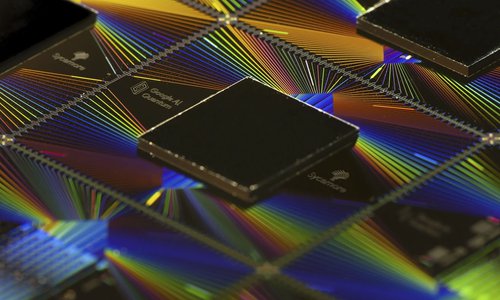HOME >> BUSINESS
China may have quantum upper hand
By Chu Daye Source:Global Times Published: 2019/10/27 19:28:40
Advantage in government planning could provide nation with lead over US

Photo: VCG
Chinese economists are suggesting that the nation may have the upper hand in the race toward quantum supremacy, even as Google scored a point last week by demonstrating the potential of its lab-stage quantum computing power.
Cong Yi, a professor at the Tianjin University of Finance and Economics, told the Global Times on Sunday that the faster conversion speed of a given new technology from laboratory to the broader economy and Beijing's advantage in government planning may give China a lead ahead of the US in quantum computing, a technology believed by some to be one of cornerstones of next-generation computer technology.
Google last week claimed that it had achieved a "quantum supremacy" milestone, which means that its computer performed a designated mathematical calculation in 200 seconds that a conventional computer would need 10,000 years to complete.
Hailing the achievement, Ivanka Trump, an advisor to US President Donald Trump, tweeted on October 23 that "It's official! The US has achieved quantum supremacy!"
Google's claims are being challenged, with IBM claiming the test could be done by its supercomputer in two and a half days. However, there is little doubt that quantum technology, which revolutionizes the way information is processed, may become a key technology in the field of computing.
Cong said that seen from the longer term, China's advantage is more apparent than the US, which backs on government-funded science programs and efforts taken by its leading multinationals.
It is believed that China leads the US in quantum communication, but lags behind in quantum computing.
Although the definitions of supremacy given by Google and Ivanka Trump are not the same, Cong pointed out that since the dawn of the computer age, a country that discovers a vital technology would likely lead the age this technology ushers in.
Chinese experts believe that the turning point brought by quantum technology is a perfect chance to assume a global leadership position, rather than being a follower, in computing.
Almost all leading Chinese technology companies, including Alibaba, Baidu, Tencent and Huawei, have invested in research involving quantum computation.
Top universities such as the University of Science and Technology of China are also making progress.
"There are weak points in China's state-led innovation system. Once the loopholes are identified and fixed, the advantage of state-led innovation will be quickly shown, just as how China developed its first atomic bomb," Cong said.
The sub-stage of competition for quantum supremacy includes the targeted training of talent and a refined top-down planning blueprint that accurately covers each of the supporting technologies needed by the matrix of quantum computing.
"Another key lies in how companies excelling in the application-end can match seamlessly with the fruit borne of state-fund-driven basic research," Cong said.
Alibaba alone has pumped around $15 billion into labs focused on future technologies, including quantum computing.
Quantum technologies were highlighted in China's 13th Five-Year Plan (2016-20). Meanwhile, the Trump administration enacted the National Quantum Initiative Act in 2018 to boost quantum research and development with a focus on quantum computing.
Guo Guoping, a key member of the research and development (R&D) team and a professor at the Hefei-based University of Science and Technology of China, said that there is a three to five year gap with the US in terms of quantum computing. "If more efforts are not paid to catching up, the gap is going to expand exponentially."
Guo cautioned that talent, a better appraisal system that focuses more on actual progress than eye-catching events, and patience from the government, investors, researchers and public are needed to ensure the sound development of quantum computing in China.
"The death valley between the lab and commercial application is very difficult to conquer," Guo told the Global Times on Sunday.
According to analysis firm Patinformatics, Chinese organizations filed nearly twice as many patents related to quantum information technology (QIT) as the US in 2017, and more than 70 percent of academic QIT patents since 2012 have been awarded to Chinese universities, with US institutions a distant second at 12 percent.